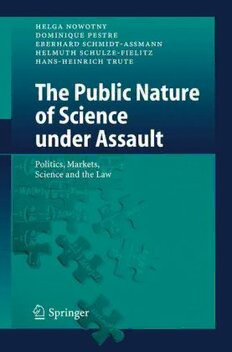
The Public Nature of Science under Assault: Politics, Markets, Science and the Law PDF
150 Pages·2005·0.698 MB·English
Most books are stored in the elastic cloud where traffic is expensive. For this reason, we have a limit on daily download.
Preview The Public Nature of Science under Assault: Politics, Markets, Science and the Law
Description:
Science has development from a self-evident public good to being highly valued in other contexts for different reasons: strengthening the economic competitiveness and, especially in high-tech fields, as a financial investment for future gains. This has been accompanied by a shift from public to private funding with intellectual property rights gaining importance. But in contemporary democracies citizens have also begun to voice their concerns about science and technology related risks, demanding greater participation in decision-making and in the setting of research priorities. The book examines the legal issues and responses vis-?-vis these transformations of the nature of public science. It discusses their normative content as well as the inherent limitations of the law in meeting these challenges.
See more
The list of books you might like
Most books are stored in the elastic cloud where traffic is expensive. For this reason, we have a limit on daily download.
